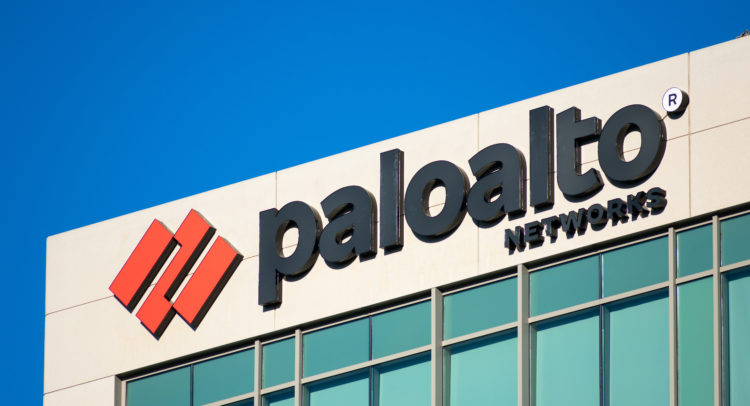With networks and network access now more vital than ever, cybersecurity firms like Palo Alto Networks (PANW) take on a whole new life. Palo Alto Networks announced its earnings after Monday’s closing bell, and the news made it clear just how valuable cybersecurity tools are to businesses throughout the spectrum.
Claim 50% Off TipRanks Premium
- Unlock hedge fund-level data and powerful investing tools for smarter, sharper decisions
- Stay ahead of the market with the latest news and analysis and maximize your portfolio's potential
Palo Alto Networks’ earnings report featured a string of wins. Earnings came in at $2.39 per diluted share. That was well ahead of TipRanks’ projections, which looked for a figure of $2.28 per share. Revenue featured an even better performance. The company posted fourth-quarter revenue of $1.6 billion, which was up 27% from this time last year.
It’s hard not to like Palo Alto Networks. The company has a broad array of solutions available in a field that’s still enjoying a renaissance, even in a post-COVID era where remote work is starting to decline in popularity. I’m bullish because this is a company that’s likely to survive any economic downturn.
The last 12 months for Palo Alto Networks shares are up overall, though not as up as they once were. The company climbed but faced volatility all along the way until it briefly touched its 52-week high up around $640. Now, the stock sits at around $508.
Is Palo Alto Networks a Good Stock to Buy?
Turning to Wall Street, Palo Alto Networks has a Strong Buy consensus rating. That’s based on 10 Buys assigned in the past three months. The average Palo Alto Networks price target of $657.50 implies 29.4% upside potential.

Analyst price targets range from a low of $517 per share to a high of $823 per share.
Flawless Smart Score, Yet, Insiders are Selling
Interestingly, Palo Alto Networks is facing some real splits in its investor sentiment figures. Palo Alto Networks currently has a ‘Perfect 10’ Smart Score on TipRanks. That’s the highest level possible. Palo Alto Networks, therefore, is one of the most likely stocks to outperform the broader market, according to this metric.
Yet, even as Palo Alto enjoys such a high rank, its own insiders aren’t so sure. Insider trading at Palo Alto Networks is strongly Sell-weighted. In fact, no insider has made an Informative Buy so far this year. It’s been over eight months since any buying has been seen at all.
Insiders actually sold $477,000 worth of shares just this month. Granted, that’s less than a thousand shares at current values. Nonetheless, it’s something worth considering.

Right Place, Right Time, Right Arsenal of Solutions
Cybersecurity spent most of the 2010s era as a growing concern, with businesses ramping up their spending therein as more shoppers and customers turned to online solutions. However, it was in 2020 that cybersecurity truly exploded (amid lockdowns). Online businesses needed to protect themselves and their customers. Their customers needed to protect themselves as well. Palo Alto Networks handily stepped in, ready to take on a range of threats.
Even a cursory look at the company’s “Solutions” page will show a dizzying array of options for businesses concerned about everything from malware to ransomware readiness and beyond.
What’s more, it’s not like any of these solutions are mere “nice to haves.” They’re vital, important solutions that will actively save money – just ask anyone who’s recovered from a ransomware attack.
Cloud Ally recently posted a study on the impact of ransomware. Just the monetary costs alone for ransomware are on the rise. The average cost is now between $570,000 and $812,360 per attack.
Attacks also cause downtime, which of course, varies from business to business. Back in mid-2021, 98% of businesses in one study said that one hour of unplanned downtime cost them over $100,000.
That also doesn’t factor in the damage to your business’s brand and reputation from the downtime. Ditto the costs of insurance, which go up with each attack.
Those figures demonstrate why Palo Alto and its contemporaries will likely have a market for as long as businesses exist. That puts Palo Alto in a great position, going forward.
Even with a recession likely in play, businesses will still need to protect themselves. The only real risk to Palo Alto is that businesses start running without ransomware or other protections because they’re simply unaffordable.
It really doesn’t matter how much downtime costs a business when it doesn’t have the money to pay for its own protection anyway. As more businesses close outright, that will be fewer potential customers for Palo Alto.
Also, expansion efforts at its current customer base will dwindle. That’s going to put the company in a hard spot, but no less hard than that of its customers.
Conclusion: PANW’s Recession-Resilient Business is Attractive
Palo Alto will not get out of a recession unscathed. However, it’s likely to be one of the last expenses cut and one of the companies best placed to survive. If a company is operating, then it’s likely going to turn to Palo Alto to protect itself and actually continue operating.
The sheer diversity of its lineup of solutions doesn’t hurt either. It can take on just about any cybersecurity threat, and given how many of those we’ve already seen, that should make Palo Alto popular.
Palo Alto stock still has plenty of upside potential left. If you’re ready to take on a big enterprise that’s likely to survive a recession, Palo Alto Networks is worth a second look, and that’s the biggest reason why I’m bullish.
















